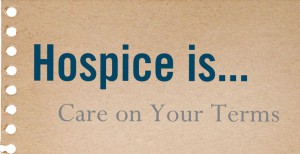Why You Should Know About Hospice
When hospice nurses were asked, what hospice is to them, they wrote the following:
– Hospice is Being There
– Hospice is Wishes Respected
– Hospice is Having a choice to be home
– Hospice is Telling the truth, even when it’s hard
– Hospice is a gift
(source)
Hospice. It can be a controversial word. For some, it stirs up anxiety, panic, fear, death – for others, comfort, a blessing, an answer. Many people limit hospice to being just about dying when, if you think about it, hospice really is about living the best you can with the most comfort, peace, and self-respect possible in your last days.
I remember a session I attended with Barbara Karnes, a pioneer of the hospice movement, she said something very strange: “Dying is the hardest thing we live through.” Pause, think about that. “Dying is the hardest thing we live through.”
She’s right, we don’t think about the living part because the dying is so terrifying, but we are alive while we are dying. It’s that strange part of life, this place of transition, the path we will never re-trace, it’s here where hospice comes in.
With November being National Hospice and Palliative Care Month, I felt this blog should take this opportunity to speak to these specialties and why they are so important.
There are so many questions surrounding hospice, here are some of the top ones we hear:
– What is the difference between Hospice and Palliative care?
Hospice is focused specifically on end-of-life comfort and care for anyone with a life expectancy of 6 months or less. Palliative care differs in that it deals specifically with people suffering from a serious illness but not necessarily dying from it. Palliative offers comfort care to long-term suffering people and, like hospice, shares the goal of making daily life more enjoyable and rich.
– What is the role of hospice?
 Hospice care is about managing a whole body of care around a person who has limited time left. Outside of the medical care and services, hospice also cares for the caregiver. Offering emotional support to the caregiver, emphasis on their own self-care, and even after the loss has occurred, most hospices provide bereavement services for at least a year to the caregiver.
Hospice care is about managing a whole body of care around a person who has limited time left. Outside of the medical care and services, hospice also cares for the caregiver. Offering emotional support to the caregiver, emphasis on their own self-care, and even after the loss has occurred, most hospices provide bereavement services for at least a year to the caregiver.
Often issues surrounding spirituality, meaning, hope, pain and forgiveness are more focused during a terminal illness. As part of the hospice healthcare team, Hospice Chaplains make Spiritual Care a priority. Chaplains offer a supportive presence and acceptance of different beliefs, cultures and values.
– When in the course of an illness should someone go on hospice?
Usually earlier than they do. When there’s a very good chance that the illness won’t be cured and the person needs help with the pain and symptoms, that’s a good time to talk to hospice about what they could do to help (www.nhopc.org). It’s all about their goal, are they still looking for curative treatment? If so, they aren’t ready for hospice. Hospice is for someone who doesn’t wish to pursue cures, their goal is quality end-of-life vs. quantity end-of-life.
– What does hospice cost?
Because hospice is provided by Medicare and Medicaid and because it really does make a difference for people in quality of life and quality of care, most insurance covers hospice care. Hospice is actually even an opportunity to relieve financial burden because hospice covers medication, supplies, and staff coming out to the home.
// do you have more questions? leave them in the comments below //
According to the National Hospice and Palliative Care Organization, 90% of adults believe it is the job of a family member to care for their dying loved one – I don’t think you’d find many hospice workers who disagree. What a hospice worker or volunteer would say to that care-giving family member is this, “I am here to help you as well. Yes, I work for hospice and your loved one is our patient, but you are their family, and I am also here to guide, support and help you. Let me. This is too hard to do alone.”
This testimonial video chronicles Karen and her family’s journey with hospice. Initially, Karen thought hospice was a bed, a place she had to go and essentially wait to die. She shares in this video how different and truly wonderful having hospice has been for her. Here’s what her husband, Bill, has to say about it:
 “The beauty of hospice is that it provides us with the resources we need to live our lives here at home … my wife is able to be [home] everyday to interact with the kids, interact with me… [hospice] puts the patient in a position to maximize whatever energy they have and it tends to have a positive impact on the patient.”
“The beauty of hospice is that it provides us with the resources we need to live our lives here at home … my wife is able to be [home] everyday to interact with the kids, interact with me… [hospice] puts the patient in a position to maximize whatever energy they have and it tends to have a positive impact on the patient.”
To learn more about Hospices around the nation, check out these resourceful & informative websites:
– Coalition of Compassionate Care of California | www.coalitionccc.org
– Hospice Foundation of America | www.hospicefoundation.org
– National Hospice and Palliative Care Organization | www.nhpco.org
|| what do you think?
– Do you have any experience with hospice or palliative care? What was it like?
– What are the first words you think of when you hear the word “hospice”?
– What questions do you still have about hospice or palliative care?
We’d love to answer them either in the comments below or an upcoming sequel to this blog post.





12 Comments
Wow, Molly- this is exactly what people need to know. I am so glad you wrote this blog! I have been a hospice advocate since my grandmother died 9 years ago. I had been caring for her in the last few years of her life- it was tough because i lived 50 miles away from her. In the end, hospice was there with her & I joined them at every possible chance. They called me to her bedside when it was time & I’m so grateful I didn’t miss that transition. Hospice nurses are true angels on Earth, a whole & all encompassing blessing to those who are dying as well as their families. Thank you, Molly! Love, Carrie
Hi Molly,
Thank you for writing this important blog! I hope a lot of people read this because it explains so much. I have both personal and professional experience with hospice and palliative care and I am a huge advocate of both! I love Barbara Karnes’ quote you referenced. Dying is the hardest thing we live through and hospice can help make it a beautiful and meaningful experience for the patient and their family.
A couple of pretty heady topics for the last two blogs but such important discussions we need to have surrounding end of life care. Thank you for pushing us out of our comfort zones!!
Becky
Great blog Molly!
I don’t have much experience with hospice other than what encounters I’ve had working here at O’Connor’s. Thank you for the information. I can’t tell you how many families truly treasure their hospice nurse. I hear it all the time, “I don’t know where I would be without hospice, and they’ve helped my family tremendously.” And on the mortuary side, they are a big help to us as well. Again thank you for all the information.
-Erin
So true, Erin. The more care a family receives – not just from us but throughout their loss experience – the healthier their healing will be. I appreciate your testimony from the families you have helped, thank you for sharing!
Molly,
I know you remember when Grandpa was dying at home he wanted to be as independent as possible until the very last. He did NOT want hospice. He was ambulatory up until about 24 hours before he died. Grandma was able to get hospice in to help just a week before he died and I remember her saying, “we should have had them a month ago.” That was what she needed and grandpa too. He just couldn’t see it and I think for him, it felt like giving up. He was such a fighter until he just couldn’t fight anymore.
Hospice was a comfort to mom because they could read the signs and tell her what was happening, what she might expect and gave practical advice as to what to do and not to do.
Having worked with thousands of families over the last 30 years from the funeral side of life, the words you quoted regarding when should hospice be engaged, “usually earlier than they do” rings true and clear.
Having had to spend weeks in the hospital while in chemotherapy, had I had a terminal diagnosis, I would have preferred to die at home. To me, that is the real gift of Hospice. To be able to have the option of familiar, more comforting surroundings during that final sacred journey. The hardest thing we have to live through.
Thank you for this thoughtful treatise,
Jeff
Molly,
Thank you for your blog about hospice. Thank you for the information about hospice. As you know I formerly worked for a hospice group and really enjoyed it. Our hospice company adopted the theme of “dying with dignity.” The people who work at hospice are very special people. I really liked the quote that said, “Dying is the hardest thing we live through.” From professional and personal experience those words are very true.
Mark